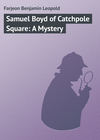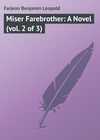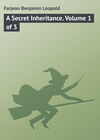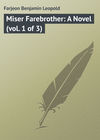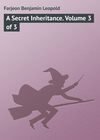Czytaj książkę: «Samuel Boyd of Catchpole Square: A Mystery», strona 29
CHAPTER LVII
DETECTIVE LAMBERT CONTINUES HIS DIARY
On Monday morning Detective Lambert, as recorded in his diary, received Joseph Pitou's letter from Milan-this time written in French, which, being duly translated by Mrs. Lambert, caused the English detective profound astonishment and delight. It was in keeping with the literary methods he pursued that he did not insert the letter in his diary, and gave no intelligible account of its contents. Neither would it have been in accordance with his methods to have omitted mysterious reference to it:
"Letter from Joseph Pitou, commencing, 'My Very Dear and Very Illustrious Compatriot and Brother-in-arms,' which I look upon as foreign bunkum. I don't object to the 'illustrious,' but we English would have put it differently.
"If I were not so closely mixed up with the Catchpole Square Mystery I should regard friend Joseph's letter as being copied out of a romance. It reads like romance. But it isn't; it is a chapter, or several chapters, out of real life. It is a feather in one's cap to be connected with such a character-not friend Joseph, but the game we are hunting. Big game. The idea of coming face to face with it is enough to scare a timid man, but that kind of risk doesn't scare an Englishman. I won't do friend Joseph the injustice to say it might scare him.
"He sends me the portrait of Louis Lorenz. The mischief of it is that Lorenz's face is covered with hair-a fine crop which in the present instance, I do not admire. When a criminal is condemned to death in Gallicia don't they shave him? A felon loses his rights as a citizen, and his moustachios and whiskers are the property of the State.
"My man is clean shaven, but the blue shade on his chin and cheeks show that he has a fine stiff crop of his own. So have hundreds of thousands of other men. Still it is a link, though not a strong one.
"The point of resemblance is in the forehead and eyes. I took as clear a view as possible of his face, and I did not fail to observe that, whether by accident or design, he sat with his back to the light. True, he did not shift his chair to place himself in that position, but for all that I decide it was design and not accident. He seldom raised his eyes; when he did he found me ready for him. Now, if it had been Applebee who sat opposite him-"
And here, presumably, Lambert broke off to indulge in a laugh.
Near midnight on the same day he continued his diary, but there was no reference to Joseph Pitou or Louis Lorenz.
"At three o'clock called on Dr. Pye. An old woman opened the door. 'Dr. Pye at home?' I asked. 'Not at home,' she answered. 'Take my card up to him,' I said. 'Not at home,' she repeated, and jammed my leg in the door. I remonstrated. 'Take your leg away,' she said. Seeing that she was determined, and having no authority to enter the house, I took my leg away, and she slammed the door in my face. Faithful creature-and well paid for her services, I'll swear. Told the lie with a face of brass, for a lie it was. Dr. Pye was at home. Where is my maid from Norfolk? She was seen to leave the house on Saturday morning. Cab at the door. Small japanned box brought out, containing her wardrobe. Cab drove off with box on the roof and my Norfolk maid inside. I ought to have had more than one man on the watch, for then I should have known where the cab drove to. Most probably to a railway station, to take my maid to her native village. Norfolk has many villages. Why was Dr. Pye so anxious to be rid of her? Answer-because she did not slam the door in my face, as the old woman did.
"With the exception of two visits from Mr. Ezra Lynn (from the description given of the man there could be no mistake it was he) there has been nothing discovered. These visits were made on Saturday night and last night. On each occasion he came at eight o'clock. On Saturday night he remained two hours, last night he remained three. Dr. Pye has not been seen to leave the house. From the tradesmen who call there nothing has been learned. The establishment is carried on on ready money lines. Everything sent home is paid for at the servants' entrance. As a ready money customer Dr. Pye bears a good name in the neighbourhood.
"I was not content with one visit to Dr. Pye to-day. At five o'clock I presented myself again-on official business. The same old woman opened the door. 'Dr. Pye at home?' 'Not at home.' 'I must see him.' 'Not at home.' There was no chance of my putting my leg inside; the door was on the chain. 'I serve this notice upon him,' I said, thrusting the paper into the old woman's hand. 'It is an order for him to appear as a witness at the Bishop Street Police Court next Friday morning, the 22nd of March, at eleven o'clock, to give evidence in the case of the murder of Samuel Boyd.' The woman took the notice, and left me alone once more on the wrong side of the door.
"I have treated Mr. Rawdon, the contentious juryman, to a sight of me on three separate occasions. Not a word have I addressed to him; I have simply given him to understand in a silent manner that he is under observation. He does understand it, and does not appear to be very comfortable.
"Where is Mr. Dick Remington? He has not been seen by any of my people since Thursday last. Has he been spirited away? Is there any connection between his disappearance and the disappearance of Abel Death? To both questions I answer, no. The notice of his absence still remains on the house in Catchpole Square. Applebee informs me that the door of that house has not been opened from the day the notice was posted on it. He is keeping close watch upon the house, and I am keeping close watch upon him. When he makes a move, or discovers anything, I shall be at hand. Things can't remain in this quiet state much longer. Some time this week there will be a flare up. Don't you think so?"
CHAPTER LVIII
THE DISCOVERY OF THE CRYPTOGRAM
While Detective Lambert was making these entries, events of which he had no suspicion were progressing in another quarter. Some premonition of startling incidents soon to happen must have been very strong within him, or he would not have been out of bed a couple of hours after midnight, prowling, in a safe disguise, in the vicinity of Catchpole Square and Shore Street. Constable Applebee came across him twice without recognising him, although Lambert gave him every opportunity, asking him on both occasions the way to Holborn. Lambert apparently was the worse for drink, and Applebee would probably have had more to say to him, and might indeed have "run him in" as a suspicious character had it not been for the interest he took in the immediate neighbourhood of Samuel Boyd's house, to which particular spot he devoted more attention than was consistent with his duties on the space of ground covered by his beat. The second time Lambert asked him the way to Holborn, the constable proffered a sensible piece of advice, to the effect that the man would be better in bed, to which he was advised to go if he did not wish to get into trouble. "Is that your advice?" asked Lambert, with a tipsy lurch. "Yes, it is," replied Applebee, "and if you're not a born fool you'll take it." "I'd have you know," retorted Lambert, "that I'm a respectable mechanic, and my advice to you is not to be so cocky. I'd make as good a bobby as you any day in the week." This angered Applebee, but did not move him to retaliatory action, and Lambert walked off, laughing in his sleeve. His light mood did not last long. Dark clouds were coming into the sky; a few drops of rain fell. There was a flash of lightning and a clap of thunder. "We shall have a storm," he muttered.
At that very moment Dr. Vinsen and Dr. Pye were closeted together, and events were approaching a climax. On the afternoon of that day Dr. Pye had received a note from his friend, announcing that he intended to pay him a visit at midnight. It was a strange hour to choose for a friendly call, and Dr. Pye was not pleased, but these men were in a certain sense dependent upon each other, and neither could just now afford to open up a quarrel; therefore, when Dr. Vinsen's summons at the street door was heard by Dr. Pye he went down himself and admitted his visitor. The interview was held at the back of the house, in the room with shuttered windows, from which a view of Samuel Boyd's house could be obtained.
"It is a dangerous time for a visit," were Dr. Pye's first words.
"By daylight," said Dr. Vinsen, "the danger would be greater. I took care to see, before I knocked, that there was no person in the street. Besides, I trust you as little as you trust me."
"You have a reason for the remark," observed Dr. Pye.
"I have, or I should not have made it. But let us be amicable-be a-mi-ca-ble. I am willing to converse in a spirit of confidence. You have wounded me by your suspicions, and you have a design which you are hiding from me-from me, your best friend. Has your spectre appeared again?"
"An hour ago I saw it at the window."
Dr. Vinsen looked at his host incredulously. Dr. Pye placed a portrait before him.
"I took this negative last night; I developed it this morning. Do you recognise it?"
Dr. Vinsen's face grew pale as he gazed at the portrait of Samuel Boyd.
"Are you mad?" he asked, "or am I?"
"Do not be alarmed," said Dr. Pye, calmly; "the man is not there. It is the picture of a vision, and is one step farther in our knowledge of the power of the human will. When I received your letter this afternoon I determined that I would search the house to-night in your company; or, if you prefer it, I will search alone."
"No; it shall be in my company. I am not afraid of ghosts."
Dr. Pye smiled scornfully.
"You turned white at the sight of the picture."
"A momentary discomposure, nothing more. I do not deny that I have not your iron nerve. I am very human, my friend; – ve-ry hu-man."
"Drop the mask," said Dr. Pye, sternly. "I am sick of your whining. Will you have some wine?"
"Something stronger than wine."
"To fortify yourself for a meeting with our spectre?" Dr. Pye laughed in derision, and produced a decanter of brandy, to which his visitor helped himself liberally. From the bottom of a cupboard he took a cobwebbed bottle of wine, which he handled and opened very carefully. He smiled as he held the glass up to the light, and then drank it slowly, as if it were really the elixir of life which popular rumour credited him with searching for. "I would give much," he said, "for that store of old wine which Samuel Boyd left behind him. Had it not been for you I would have had every bottle in this house."
"And so risked discovery," said Dr. Vinsen. "As it was you courted danger by taking two bottles to gratify your insane tastes."
"I have courted greater dangers and escaped them. You are too cautious, my friend. All my life I have found safety in boldness. You accuse me of withholding from your knowledge a design which I have in view. What design?"
"In good time, my very dear friend. There are other matters first. Before we go into them, a question. Does your patient remain in the same state?"
"There is no change in him."
"He will disclose nothing?"
"His mind is a blank."
"That is the result of your fine plan," said Dr. Vinsen, with a sneer. "Perhaps you will acknowledge that my plan was the best-to silence him and leave him in the cellar."
"I acknowledge nothing. The reasonable presumption was that he could have given us a clue. Time enough then to have silenced him. As it happens he has failed to be of service to us."
"How will you dispose of him now without drawing suspicion upon you?"
"Upon us, you mean." Dr. Vinsen shifted uneasily upon his seat. "I will find a way, and you shall share the risk." He smiled as he added, "I will insure your safety for a small premium, so we will not waste time in recrimination. Come to the 'other matters' you have referred to, and of which I am as yet in ignorance."
"Not quite in ignorance, my friend. Surely I have prepared you, surely I have been patient. I decline to be placed in a false light." He took out a pocketbook and laid it on the table, guarding it with his hand. "I have a conscience; I must justify myself even in your eyes."
"Is it worth while to make the attempt?"
"I think so; I really think so. I must lay my head upon my pillow with my mind at ease-my mind at ease. You, with your lofty notions and your wild search for the unattainable, you with your spectres and visions, know little of the sufferings of a sensitive spirit such as mine."
"Faugh! Is this worth while?"
"You have your ways, I have mine," said Dr. Vinsen, with a sly smile. "I must trouble you to listen while I go over the ground."
"So be it. And if my suspicions are correct-and they generally are-I may trouble you to listen while I go over the ground."
"It will be a pleasure. I think it is three years since you and I became acquainted. Correct me if I am wrong."
"It is immaterial. Say three years-or thirty."
"No, my friend; let us be exact. This is an affair of figures. It is three years since you wrote to me in acknowledgment of a circular you received from me. I had money to lend, you required a loan. I advanced you five hundred pounds."
"Four."
"Five, my friend, five. The odd hundred was deducted as payment of interest in advance."
"Part payment."
"You have an excellent memory. I need not go into the details. In the course of a few months you required more money and I advanced it to you."
"Spare me the details of each transaction. Come to the point."
"I will. Up to the present day you have had from me, in various sums, at various times, a total of three thousand pounds-"
"In actual money, not half that."
"Which, with interest added," continued Dr. Vinsen, alias Ezra Lynn, not troubling himself to argue the point, "amounts now to a trifle over five thousand pounds. Will you oblige me by looking over these figures and verifying them?"
"No, I will take your word that they are correct, according to your reckoning."
"I thank you for your confidence," said Dr. Vinsen, who did not, however, seem to appreciate this indifference. "It is not to be supposed that I advanced my hard-earned capital without some sort of security. You gave it to me in the shape of a bill of sale over these art treasures of yours, for which you have an absurd passion, and which I do not deny have a marketable value, and over every piece of portable property in this house. From time to time I have urged you to discharge the debt, wholly or in part, and my appeals have been disregarded. My dear friend, there is a time when one's patience becomes exhausted. Need I say more?"
"Yes. You are only in the middle of the chapter. Samuel Boyd has to be introduced. Proceed."
"At your wish," said Dr. Vinsen, with evident reluctance. "Some six weeks ago, when I was pressing you for repayment, you made mention to me-"
"Stop. When you were pressing me for repayment and threatening to sell me up-you left out the latter clause."
"You made mention to me of a plan, which would not only enable you to repay me what you owed me, but would result to our mutual advantage. You had, you said, secret access to the house of Samuel Boyd, who was in the habit of keeping there considerable sums of money, of which it would be easy to obtain possession. Without risk, without danger. You laid particular stress upon that."
"I did," said Dr. Pye, and the inscrutable smile which accompanied the words did not add to his confederate's composure.
"You needed a partner in the execution of your plan, a sleeping partner, you said, who would have nothing to do but to assist in removing the cash and valuables from his house to this, for which assistance he was to receive half the proceeds."
"Say spoil."
"The proceeds. I objected, not being willing to be a party to an act of personal violence. I am a peaceable man, and have made my money by peaceable means."
"By peaceable fraud."
"Why use harsh terms? All my transactions are legal, and protected by the law. In reply to my objection to a deed of violence you told me that you could in a moment render a sleeping man so utterly insensible and oblivious to all that was passing around him as to utterly remove every possible chance of risk. We were to enter the house when Samuel Boyd was asleep; you were to go into his chamber and render him insensible and unconscious."
"While you remained outside," said Dr. Pye, still with the inscrutable smile on his lips, "in happy ignorance of the sleeping man's fate."
"I object to these interruptions," said Dr. Vinsen, sulkily. "Finish the story your own way."
"I will. I informed you that Samuel Boyd, for an unknown purpose of his own, had been for some weeks past withdrawing large sums of money from the bank, and had been selling securities, and that I expected he would have in his safe on the night of March the 1st several thousand pounds, of which I offered you half for the tame part you were to play in the robbery. Your cupidity was aroused; you could not resist the bait, and you consented to become my partner in the crime. You do not like the terms I use; they are the correct terms. I am no canting psalm-singer; when I commit a crime I accept the responsibility; I do not shirk and whine; and as for the penalty, trust me for evading it. It was arranged that out of my share of the spoil I was to pay you what I owed you, so that you had a double interest in the success of the plan. The night arrived, and you were here, jubilant, expectant, greedy for the gold, but yet with a craven cowardice for which I despised you. However, you screwed your courage to the sticking point, and when all the lights in Samuel Boyd's house were extinguished I showed you how I obtained access to the premises. We entered in silence, and undetected; we made our way up the stairs and entered the office which contained the safe. You shook like an aspen, and I left you in the office and went alone into the bedroom, carrying a light. At that very moment Samuel Boyd awoke and started up in bed before I had time to press upon his face the handkerchief which I had prepared to render him unconscious. He sprang from the bed, and the handkerchief fell from my hand. One cry escaped his lips-only one, for my hand was on his throat. But he was strong, a more powerful man than I had conceived him to be, and he struggled with me so determinedly that we stumbled together into the office, where you stood, white-faced and trembling. By some means he got hold of a pistol, and fired two shots. One bullet went into the wall, where it was found by our good friend Remington, evidence of which was given by him and Lambert the detective at the inquest. Where the other bullet went has not yet been discovered. I thought I was struck, and for a moment my hold on Samuel Boyd relaxed. His eyes fell upon you, and your name escaped his lips, which was the first intimation I received that you had had transactions with him. That roused you to action, for you knew that if he were left alive you were doomed. You sprang upon him, and bore him to the ground. Then it was two to one. Our hands were at his throat. Whose fingers gave him the coup de grace?"
"Yours," said Dr. Vinsen, in a hoarse whisper.
"Yours," said Dr. Pye, calmly, "as I am ready to testify on my oath. However it was, there lay Samuel Boyd, dead before our eyes. We came to commit a robbery; we had committed murder. As we stood gazing upon the dead body we heard a knock at the street door, and I thought you would have fainted, you were so terror struck. In a whisper you suggested flight; had your advice been followed we were lost, for there was no time to mask the means by which we had obtained access to the house. The knocking continued, and it was then that the opportunity was afforded me of displaying one of my talents. As a mimicker of voices I am unrivalled, and you are aware of my skill in another histrionic achievement. It was imperative that the summons should be answered, or the neighbourhood might have been aroused. I seized your hand, my dear accomplice in crime, and we descended to the street door. Mimicking Samuel Boyd's voice I inquired who was there. The reply was, 'It is I, sir, Abel Death. For God's sake let me speak to you!' Fearing the result if the demand was not complied with I drew the bolt and the chain, and dragged the man in; and as he entered you struck him with such force that he fell to the ground senseless. I have never inquired why you struck him."
"It was an impulse of passion," said Dr. Vinsen, in a faltering voice.
"Foist those subterfuges upon weaker men. I did not inquire because I knew. You held the candle above your head, and Abel Death saw your face, as the man we had murdered had done, and recognised you, as he had done. Why do you wince? We did murder him, comrade in crime, and are both 'liable to the law for the deed." Quietly as he spoke he seemed to take delight in associating Dr. Vinsen with himself in the ruthless work. "Your thought, when you struck Abel Death down, was that if he were allowed to go free he would be able to give evidence against you."
"And against you."
"Thanks for your consideration of me, but I can see to my own safety without aid from such as you. When yours is imperilled there is something of the savage in you; I give you credit for so much manliness. You would have killed him where he lay."
"Had you made an end of him," said Dr. Vinsen, morosely-
"Or had you done it," interrupted Dr. Pye. "Why give me all the honour of the task we were engaged upon?"
"His tongue would have been silenced for ever," concluded Dr. Vinsen, "and we should have been safe."
"I am not so sure of that. Anyway I deemed it prudent that he should live till we had made search for Samuel Boyd's treasure. If that search had been successful I might have handed the poor clerk over to your tender mercy. But it was not successful. In the safe we found a paltry two hundred pounds, and bills, and documents, and books of accounts. The books were valuable to us, for if they had fallen into other hands, it would have been seen that we were both indebted to the man we killed. Among the bills were many of mine, and some of yours. It was not till then that I learned you owed him money; and your motive for joining me in the robbery was partly explained. The books and bills destroyed, and the man dead, your indebtedness to him was cancelled. You are a cunning dog, Ezra Lynn. There were also Lord Wharton's bills, which, I fear, are valueless to us."
"You have not kept them!" cried Dr. Vinsen.
"I have, and every document we took away."
"But they implicate me!"
"It is perhaps for that reason I have not destroyed them," said Dr. Pye, coolly. "We sink or swim together, Ezra Lynn, so long as we remain in England. Among the documents was the list of Lady Wharton's jewels, and a statement of how Samuel Boyd became possessed of them, with other statements which informed us that he was expected to present himself at Bournemouth on the following Wednesday, with the fifteen hundred pounds he had arranged to advance to her. But where were the jewels? We hunted for them in vain, and to this hour have been unable to lay hands upon them, although we know they must be there."
"They may not be. The burglar who broke into the house on the night you went to Bournemouth may have found them."
"No. What we could not find he did not find. On the night I went to Bournemouth!" said Dr. Pye, and for the first time a laugh escaped him. "Tell me another man who could have so successfully imposed upon her ladyship, who would have had the audacity to carry out a deception so hazardous? Do you not feel proud in having a partner so bold and daring? Judge by that of what I am capable, and whether I am fitted to hold command. After what I have seen these five nights past, the image of Samuel Boyd, who lies dead in his grave, would any other man have the hardihood to enter that house? I am a stranger to fear, Ezra Lynn. When our conversation is ended we make search for the lost jewels; it may be the last chance we shall have. To finish the story of that Friday night before you disclose what is in your mind. I made Abel Death secure by plunging him into a state of insensibility from which it was impossible for him to recover till late the following day, and then we removed the books and papers, leaving behind us one document which fixed the guilt of the murder upon Mr. Reginald Boyd."
"How is it," asked Dr. Vinsen, "that that accusation has not been produced?"
"There are more ways than one of accounting for it. The man who made the burglarious entrance into the house may have seized the papers we left upon the table, in the expectation that he could turn them to profit, to discover later that to produce them would be putting himself into the criminal dock; or it may be that Mr. Richard Remington appropriated the document and destroyed it, out of regard for Inspector Robson's family, and probably also because he believes in Mr. Reginald Boyd's innocence. Hark! Do you hear the thunder? A storm is approaching. All the better for our purpose. It is two o'clock, and we have little time to waste. I will make short work of the conclusion of that night's proceedings. At your suggestion we placed the body of Samuel Boyd comfortably in its bed, and cleared away all traces of the struggle. Your argument was that, as it would become known that Mr. Reginald Boyd visited his father that night, it would be supposed he had adopted the expedient to make it appear that the murdered man died a natural death, and so avert suspicion from himself. It was a lame argument, for the marks of our fingers were on his throat, but I humoured you, as we humour a child who asks a harmless question. The last thing we did was to carry Abel Death from the house. Some days afterwards we learned that Mr. Richard Remington was taking an active interest in the disappearance of the clerk, and for the purpose of ascertaining to what extent he was in communication with Mrs. Death you introduced yourself to her under the false name, by which you are known to her and to him. I raised no objection to the plan; the risk was yours, and I was willing that you should run it. You used my name without my authority, and I understand why you did so. It was to make me a partner in the risk, was it not?"
"Yes," replied Dr. Vinsen, sullenly.
"An honest confession. You feared that I should shirk the consequences of our crime-let us call it by its usual name-to which you attach so much importance. You are mistaken; I am ready to meet them, always, always ready. I have overcome greater dangers, have steered my way safely over rocks and quicksands far more perilous. Shall I recapitulate the particulars of a later incident in this affair? That it chanced that one of the men summoned on the jury was a person who owed you money which he could not pay; that you held him so completely in your power that you could bring worldly ruin upon him; that you entered into a conspiracy with him to use his influence with his brother jurymen in order that a verdict of wilful murder against Reginald Boyd should be returned; that you-"
"Enough of that," interposed Dr. Vinsen. "Surely it is not necessary to go into these details."
"A statement of them refreshes the memory; it is important not to lose sight of the smallest incident in this complex matter-but as you will. And now, my worthy partner, before we proceed to the house that faces this window, explain what you mean by saying that your patience is exhausted, and by your threat with reference to the art treasures I have gathered, which I value as I value my life?"
"You have had a large sum of money from me," said Dr. Vinsen, doggedly. "I claim my own. The debt must be discharged."
"And if payment is impossible just now?"
"I cannot wait any longer."
"Shall we say you will not?"
"You goad me to it. I will not."
"But it happens that you must wait my pleasure-aye, must! Ezra Lynn, you little know the man upon whose fate yours depends, and who would have no more compunction in striking you dead where you sit than in plucking the leaves from a rose. You would rob me of my treasures-the treasures I have purchased with blood. Not while I live-not while I live. Here is beauty that I can worship, the work of the great masters of the past, exquisite colour and perfect form, in the production of which genius toiled with a divine end in view. If my history ever becomes known the world will read the story of a man who greatly dared, of one who loved beauty in its every shape and form, of one who, unblessed with wealth, stopped at no crime to gain it, in order to follow his star, and who, when all was lost-if such a fate befall him-defied his enemies and defeated them in the moment of their victory. You start at the word crime. It is a common word, and I use it in the common sense, but not in the sense in which I view it. All things are justified to men who dare as I have dared. What is the sacrifice of a human life in the endeavour to wrest nature's sublime secrets from her breast? Man wars with man, and strews the battlefield with the slain. Is that called a crime? We glorify it, we sing hymns to it, the church cries 'Hosanna!' and its priests praise the Lord of Hosts who crowned our banners with victory. If victory crown mine-and it may yet, in the teeth of all obstacles-so shall I be praised and glorified. Crime! There is no such word to the victor. I laugh at the law that would make a criminal of a hero. Not for the first time shall I have successfully defied it."
He paused, and smiled scornfully as a flash of lightning pierced a chink in the window, which he instantly unshuttered.
"We may be seen!" cried Dr. Vinsen, catching his arm.
He took no heed of the warning, but stood at the window, and smiled again at the peal of thunder at the lightning's heels. Whether the words he had uttered were or were not the ravings of a madman, it was clear that he was terribly in earnest.
